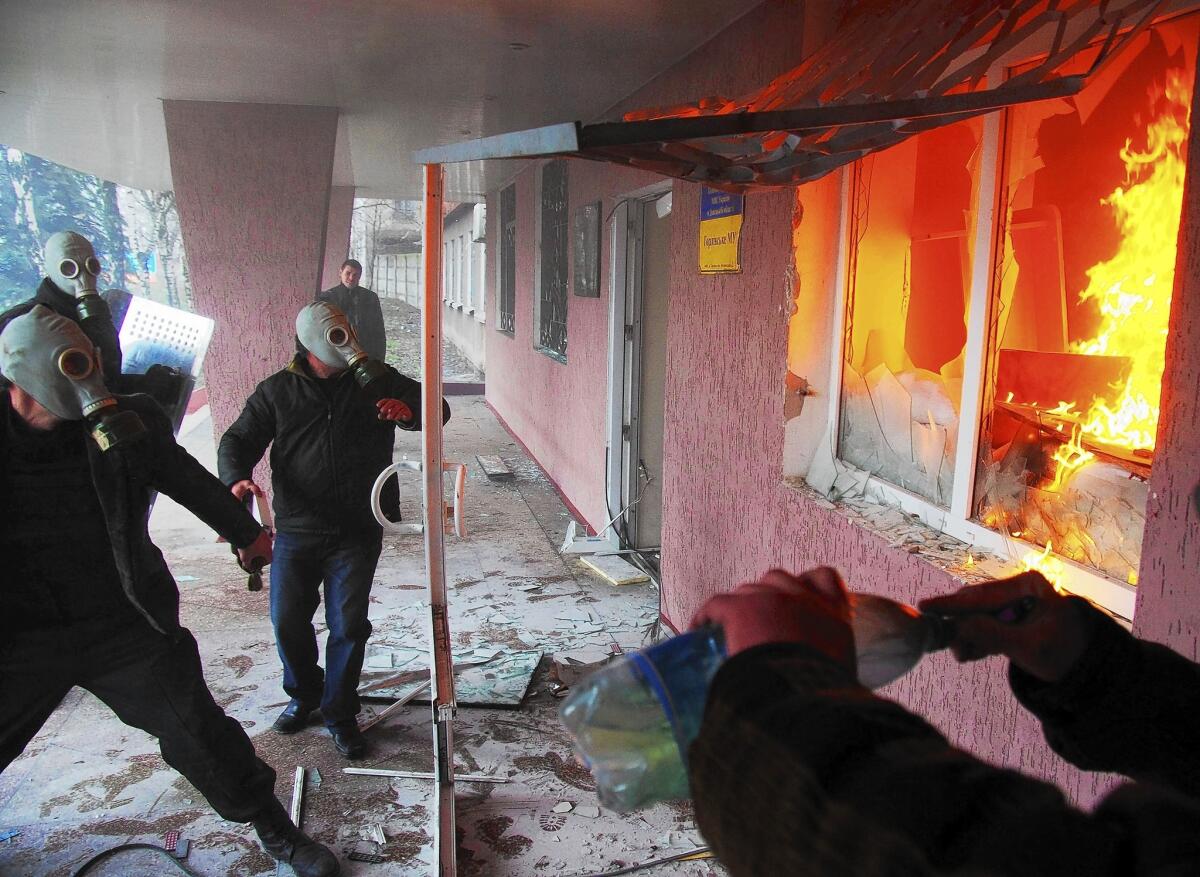Pro-Russia police help foil Ukraine crackdown in east

- Share via
MOSCOW — Ukrainian police sympathetic to pro-Russia separatists occupying government buildings helped thwart a threatened crackdown Monday, undermining the government’s credibility and encouraging the gunmen to grab more facilities.
Ukraine’s Interior Ministry said in a statement that it planned to replace 12,000 officers in the besieged east, blaming disloyal police for the failure of what it termed an anti-terrorism operation.
Acting President Oleksandr Turchynov had issued an ultimatum Sunday to gunmen holding government facilities in Donetsk, Luhansk, Slavyansk, Kramatorsk and other cities, telling them to lay down their arms by early Monday.
But after local police failed to back up the security forces, Russian-speaking gunmen attacked and seized an airstrip near Slavyansk and an administrative building in the mining town of Horlivka in the Donetsk region, the UNIAN news agency reported.
One Ukrainian Security Service convoy preparing to move against the separatists was ambushed as it attempted to enter Slavyansk. A senior officer was killed and five people in his detail wounded, the private TSN television network reported.
In an address to parliament in Kiev, the Ukrainian capital, Turchynov accused local police of widespread sabotage.
“The main problem is that the police, formed in the times of [former President Viktor] Yanukovich, proved incapable of offering resistance to separatism,” Turchynov said. “We will renew the police ranks in the nearest time to form a force that will be able to withstand the onslaught of the Russian aggression and separatism.”
The ambush in Slavyansk was part of “wide-scale military aggression of the Russian Federation,” the Ukrainian Security Service charged. U.S. and European officials also accuse the government of Russian President Vladimir Putin of inciting the armed takeovers to unsettle Ukraine ahead of its May 25 presidential election.
The White House said President Obama spoke with Putin on Monday at Russia’s request, and that he “expressed grave concern about Russian government support for the actions of armed, pro-Russian separatists who threaten to undermine and destabilize the government of Ukraine.” It did not characterize Putin’s response.
White House Press Secretary Jay Carney also confirmed that CIA Director John Brennan had visited Kiev over the weekend. Russia has accused the U.S. of stirring up unrest in Ukraine and cited Brennan’s presence there. Carney said Brennan’s meeting was aimed at strengthening security cooperation with Ukraine.
Turchynov called United Nations Secretary-General Ban Ki-moon on Monday to ask for U.N. peacekeeping troops to help restore order in the occupied cities, according to the Ukrainian presidential website. But any such mission would require U.N. Security Council approval. As a permanent member, Russia wields veto power.
A Kiev-based political analyst said the Ukrainian government’s failure to act on its ultimatum deadlines had weakened its image and authority.
“The more ultimatums the authorities put forth and then do nothing, the more skepticism their threats evoke,” said Dmitry Tymchuk, a defense analyst with the Center for Military and Political Research. “Turchynov’s proposal today to conduct a joint anti-terrorist operation together with U.N. peacekeepers is in fact a statement of Ukraine authorities’ own impotence.”
Ukraine’s Security Service released what it said was evidence of Russian direction of the unrest: a recording and transcript of a man speaking Russian, purportedly a leader of the militants in Slavyansk, consulting with a coordinator across the border in Russia.
In the recording, the commander, code-named “Shooter,” is heard discussing the ambush in which the senior Ukrainian officer was killed. “Who did we put down? They must have been some big fish,” he is heard to say.
European Union foreign ministers met in Luxembourg on Monday to consider imposing additional sanctions on Russia, and reportedly added several more names to a list of officials and businessmen subject to visa bans and asset freezes. The new names were not immediately disclosed.
The seizure of government installations in Ukraine’s east and south “is something that is being planned and brought about by Russia,” British Foreign Secretary William Hague said.
U.S., Russian, EU and Ukrainian diplomats plan to meet Thursday in Geneva, but there is little expectation of a breakthrough.
Loiko reported from Moscow and Williams from Los Angeles. Times staff writer Kathleen Hennessey in Washington and special correspondent Victoria Butenko in Kiev contributed to this report.
More to Read
Sign up for Essential California
The most important California stories and recommendations in your inbox every morning.
You may occasionally receive promotional content from the Los Angeles Times.














